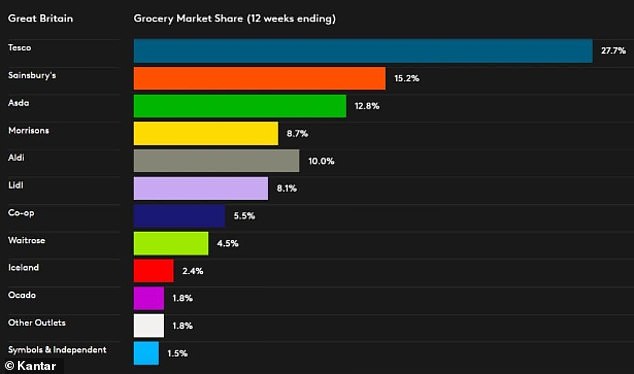No BBQ start to the summer: Wet weather has consequences for supermarket turnover
- Kantar: Grocery sales rose just 1% in the four weeks ending June 9
- The bad weather negatively affected demand for traditional summer products such as sunscreen products
Wet weather and lower inflation helped supermarket sales rise at the slowest pace in two years, new figures show.
Grocery sales rose just 1 percent in the four weeks to June 9, according to market research organization Kantar, compared with 2.9 percent in the previous four weeks.
Fraser McKevitt, head of retail and consumer insight at Kantar, claimed people were being ‘deterred from going to the shops’ as Britain experienced its wettest spring since 1986 and one of the dampest on record.
Humid days: Wet weather and lower inflation saw supermarket sales rise at the slowest pace in two years, according to new figures from Kantar
The number of visitors fell slightly: shoppers visited the supermarket an average of 16.3 times per month, compared to 16.4 in June 2023.
The poor conditions negatively affected demand for traditional summer products such as sunscreen, which Kantar revealed fell by around 25 percent compared to the same month last year.
At the same time, Britons bought products they would not normally expect to buy in June, such as reheating fresh soup, sales of which rose by almost a quarter.
However, Kantar found that the percentage of households describing their financial position as ‘comfortable’ is 36 percent, the highest level in two and a half years.
This followed a fall in costs in almost a third of food categories, such as milk, butter and toilet paper.
Food sector inflation fell for the 16th straight month to 2.1 percent, the lowest since October 2021, amid a continued decline in energy and fertilizer prices.

Online giant: Ocado was the fastest growing grocer for the fourth month in a row, with sales at the online group up 10.7 percent in the 12 weeks to June 9
While McKevitt acknowledged that the cost-of-living crisis was not over, he said: “There are positive signs that many of us no longer feel the need to restrict our spending so much.”
Kantar believes the UEFA European Football Championship could strengthen grocers and pubs depending on how successfully England and Scotland perform at the tournament.
It noted that the share of sales of beer and lager in promotion had risen by more than 40 percent in the past four weeks.
“Retailers will be competing with fans who leave home to watch football, but also with each other,” McKevitt said. ‘Cafes in particular could benefit from a boost – regardless of whether football comes home or not.’
Cafes in particular can benefit from a boost – regardless of whether football comes home or not.’
In addition to this announcement, Kantar revealed that Ocado was the fastest growing grocer for the fourth month in a row, with sales at the online giant increasing by 10.7 percent in the 12 weeks to June 9.
It also said that Tesco, Britain’s largest supermarket, expanded its market share by 0.6 percentage points to 27.7 percent, the best figure since February 2022, as sales rose 4.6 percent.
In contrast, Asda’s market share fell to 12.8 percent from 13.1 percent in the previous 12 weeks as the company faced stiff competition in the discount retail sector.
Russ Mould, investment director at AJ Bell, said: ‘Asda has traditionally positioned itself on the value side of the market, but this has become a crowded space.
The company will lose German discounters Aldi and Lidl on the one hand and some of the big traditional players on the other, including Sainsbury’s and Marks & Spencer, both of which are working hard on the value side.”
